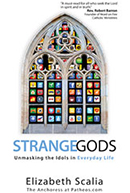
Pope Francis receives an 88% approval rating from American Catholics. Elizabeth Scalia wonders if we’re guilty of idolatry. – Image courtesy of Catholic Church of England and Wales (http://bit.ly/1btKUFj)
Elizabeth Scalia claims to be a shy person, happy to hang in the background. But the popular Catholic Portal editor at Patheos, writing as “The Anchoress”, doesn’t shy away from offering opinions as strong as garlic. In her recent book, “Strange Gods: Unmasking the Idols of Everyday Life,” she has plenty to say about the dangers of modern day idolatry. But perhaps most controversial is Scalia’s recent assertion that the world may be making an idol out of Pope Francis, who recently received an 88% approval rating from American Catholics. Here, we discuss how she understands idolatry and the reasoning behind her questioning of American’s love for the popular Pope.
RNS: It’s so much easier to spot other people’s idols—in other centuries or on other continents in other religions—than to spot our own. What’s at the root of this blindness?
ES: It’s always easier to spot deficiency in others, right? Someone else’s hypocrisy or mean-spiritedness is always obvious to us, another century’s shortfalls are easy to see in hindsight, another nation’s aggressions more obvious than our own. We all want to believe we’re the good guys.

Elizabeth Scalia is author of “Strange Gods” and editor of Patheos’ Catholic Portal. – Image courtesy of Patheos
The truth is, we are all good guys, and sometimes we are all bad guys, too. In terms of idolatry, we all seek to find ourselves reflected in that thing or person that has characteristics we imagine we possess, too. Why did the ancient Israelites form a golden idol–and why a calf, especially? They’d been wandering a desert; they were feeling lost, uncertain of what they were becoming, and hungry for what was familiar. A calf was well-defined, strong, life-sustaining; its purpose was known. Hew it out of gold, polish it up and voila! In the glistening surface of the calf they literally saw themselves, projected onto this vital image. [tweetable]Our idols are always about ourselves.[/tweetable]
RNS: Were the eyes of ancient folks any more attuned to recognize their idolatry than ours are today?
ES: I suspect we’re as blithely ignorant about our idolatry as humans ever were. The Israelites were content in their idolatry until Moses showed up and said, “you’ve got to be kidding me…” Our tendency to creating idols begins, as Gregory of Nyssa wrote, with an idea: “Ideas create idols.” A good example of this can be found in the political arena. We discover a candidate that seems to be just like us – or what we imagine ourselves to be – and then we give ourselves over to him or her and will brook no criticism or dissent. Think of Barack Obama and Sarah Palin in 2008. In both cases, their fans saw themselves in their particular candidate, and the passionate enthrallment of idolatry had a hand in dividing the nation in new, deeper ways. We’re still reeling from it, and from the idols we have made of our ideologies.
We’ve been dealing with this since Eden, when an idea of becoming “like as gods” ourselves grew large enough to tempt us to disobedience, and for that matter, rationalization and deceit. In many ways, we’re still in Eden, still forming (or encountering) ideas, polishing them up and making them shiny enough to reflect us back to ourselves – like that apple – and then we surrender to it. But do we devour the idol that has developed of our ideas, or does it devour us?
RNS: And how do we wake up to recognize the idols that grip us?
ES: First, be willing to entertain the notion that idolatry is a real, modern possibility, and not some ancient habit we’ve moved past. Gregory of Nyssa’s full sentence was “Ideas create idols; only wonder leads to knowing.” With that in mind, we can take a look at our ideas. Which do we cling to with such fervor that we’ve stopped seeing the humanity of others who hold different views, or stopped wondering that there might me more to an issue than we’ve allowed? Which have we so prostrated ourselves toward that we have lost sight of love, compassion, of our own deficiencies? That’s where to start. That’s where awareness begins. Once we start looking for idols in our lives, if we’re honest, we’ll find we’ve erected them all over the place.
RNS: Among the idols you address in your book, which is the one that most tempts you?
ES: Well, the idol is a “Strange God” we manage to erect before the Almighty, which creates a barrier to God’s outreach to me, and mine to God’s. That can change every day.
Some days, I might give primacy to memory – put old wounds and grudges up all around me and serve them, surrender to them and commune with their bitter fruit. Other days, perhaps it’s an egotistical turn around the Internet: “look at me, everyone, look at my clever turn of phrase!” The good thing about the Internet though, is that there is always someone to remind you that you’re not “all that.” This is why awareness is so important, though. We can’t help but create idols – we do it all day long – but if we can identify them, and catch ourselves doing it, then we can ask for help in taking them apart. An examination of conscience that begins with a real look at that first commandment really helps us see where we’re blowing it with the rest of them, and help us to contrition. And then confession. The first time I confessed to idolatry the priest and I were both in new territory. He said he’d never had anyone confess it before.
RNS: Some Protestants believe the Roman Catholic relationship to Mary and the saints could be idolatrous. Your thoughts?
ES: That indicates a very limited way of thinking about many things, and perhaps a willful misunderstanding. Statues are not idols in and of themselves; what they are, really, are remembrances. Do Protestants have pictures of family around or a bust of Beethoven, or a bronzed pair of baby shoes? Sure. Do they worship those things? Of course not. Nor do Catholics worship statues or images; they are our remembrances of family – ancestors who have gone before us and are now part of the great cloud of witnesses.
Believing that Christ has conquered death and that “all things are alive in the sight of their King” we assume they are among the throng in heaven, and we therefore ask for their intercessory prayer in the same way I might ask you to pray for my intentions. Who better to ask for prayers than those who are already in the presence of God, or who better than the very Mother of the Christ, so beloved of God as to be privileged to nurture and bear the Incarnation? The Communion of Saints seems like a very efficient support system, to me, but it is not worship. Our worship is reserved for the Triune God alone.
RNS: You recently wrote an article asking, “Is the world making an idol of Pope Francis?” which caused some Catholics to squirm. Can you explain how we may be making an idol out of Pope Francis?
ES: People can make an idol of a pope — any pope — and again, it’s because his ideas seem to validate us and our ideas. The danger in this is that we can fall in love with our idea of the pope without ever really hearing a word he is saying, or internalizing the lessons and adopting the habits of prayer, service, or humility that he is exhorting us to. The point of my piece, which by the way, annoyed a lot of people, particularly if they read the title but not the whole text, was that if we’re only hearing what we want to hear from Francis, or truncating his words so they more closely align to our thoughts, then yes, we’re in danger of making an idol of him.
Interestingly, the excellent Antonio Spadaro interview with Pope Francis was released the day after the piece was published, and we kind of got to watch my thesis play out in real time. But this was also true, in a reversed sort of way, with Pope Benedict XVI, whose pronouncements were often whittled down to narratives that served a cause or agenda, but were not completely accurate reflections of his statements. Again, it’s our nature. [tweetable]We want to see reflections of ourselves in all things.[/tweetable]






